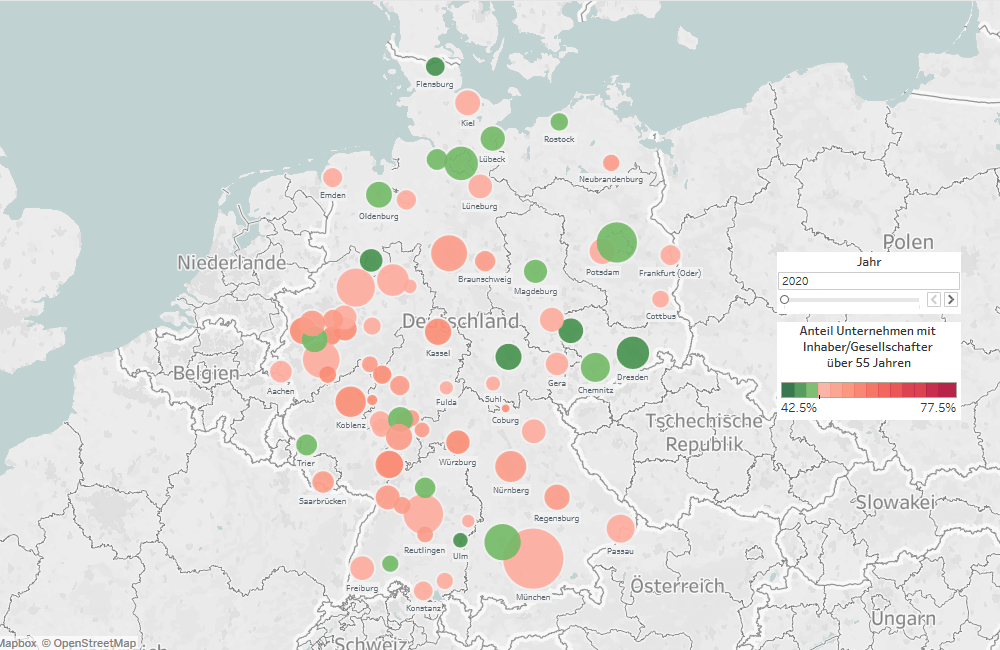The lack of successors threatens the backbone of the German economy. Germany’s business community is ageing rapidly: In just five years, the majority of all entrepreneurs will be well over 55 years old. This is the result of an analysis analogous to the 79 German IHK districts. The largest nationwide study on generational change in companies, conducted by the consulting group KERN, confirms the pressure on family entrepreneurs in Germany to act more than ever in the sign of the Corona crisis. The front-runner in terms of companies in need of succession is the city of Munich, followed by Stuttgart, Berlin, Münster, Hanover and Cologne. The construction industry and retail and wholesale trade are particularly affected: In these sectors, most entrepreneurs will be older than 55.
The KERN study focuses on the age development of family businesses in Germany. A total of 580,000 companies in the turnover categories of 250,000 euros to 50 million euros were surveyed.
Every second company boss older than 55
In addition, the number of directors/shareholders and owners was structured into four age groups:
- Year of birth 1971 until today
- Year of birth 1966 to 1970
- Year of birth 1956 to 1965
- Year of birth 1955 and before
For a good overview, entrepreneurs over 55 years of age 55 years and under 55 years were analysed over time from 2020 to 2025. were analysed.
The most important result of the study is the dramatic ageing of German bosses with a simultaneous lack of successors. After all, the cohorts of entrepreneurs with the highest birth rates in this republic are slowly having to think about retirement:
- 51% of all company leaders are already older than 55.
- The number of small and medium-sized enterprises in Germany that have to organise a succession for their boss will rise to around 70% of businesses by 2025. This affects over 1.5 million jobs in Germany.
Subsequently, the company data were also subdivided according to their sectors, thus giving a previously unknown level of detail on the follow-up shortage of individual sectors.
It is important to understand that in the German Mittelstand, more than 90% of family businesses employ fewer than 25 people and generate less than 5 million euros in turnover,’ says Nils Koerber, founder of the business succession specialists, KERN.
KERN partner Ingo Claus adds: ‘Due to the combination of the Corona crisis and demographic developments, securing succession is becoming the most important issue for SMEs. In times of a lack of skilled workers, entrepreneurs must look for successors for their employees, managing directors and also themselves?
The analysis shows that in Germany in just five years’ time a good 70% of all owners and managers will be 55 or older. This age development in family businesses is often accompanied by an investment backlog and a dangerous loss of substance, warn the experts at KERN. Depending Depending on the personal state of health of the shareholders, the majority of German family businesses are faced within a few years with the question of how to succession reliably and with a view to the future.
Reducing the lack of successors through a new founding period
Where are the next entrepreneurs supposed to come from?” asks Ingo Claus against the backdrop of demographic developments. The low birth rate is already causing a dramatic shortage of skilled workers and automatically leads to a shortage of successors. The organisation of successful generational changes is therefore also the greatest future risk for German family businesses? In order to counter the lack of entrepreneurs, the succession specialists believe that a new German start-up era is needed.
Professional preparation and sufficient time for the succession specialists are the be-all and end-all for success in this question of in this question, which is also existential for millions of employees. Successfully successfully organised succession arrangements will ultimately be a question for the future for the further development of the Federal Republic’s economic and innovative strength? Germany?, says Koerber, who is also increasingly faced with consulting mandates where, due to ageing and loss of substance, succession is no longer economically viable. succession is no longer economically feasible.
KERN - Corporate Succession is one of the largest consulting groups for corporate succession in Germany, Austria and Switzerland. The experts concentrate exclusively on the purchase and sale of family businesses. sale of family businesses. As a special feature, the consultants qualified consultants also act as mediators and coaches in intra-family generational mediators and coaches, they also take care of intra-family generational change processes in families.
You can access the interactive map via this link: https://www.kern-unternehmensnachfolge.com/studie-unternehmensnachfolge-deutschland-2020/
The regional fine data as well as subdivisions into the The regional fine data and subdivisions into the various sectors are available on request.
You might also be interested in this:
Free webinar: The seven most expensive mistakes in company value
Interview: Preparing the succession within the family well
Selling construction companies: Is it worth it in the construction boom?
3 practical tips for preparing a business succession
Employee information when selling a company: How do I tell my employees?
Successfully selling IT companies

